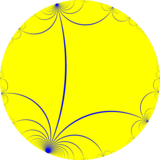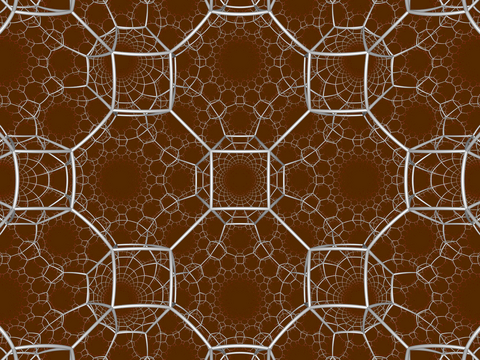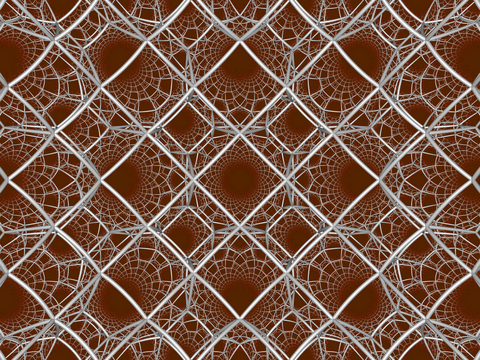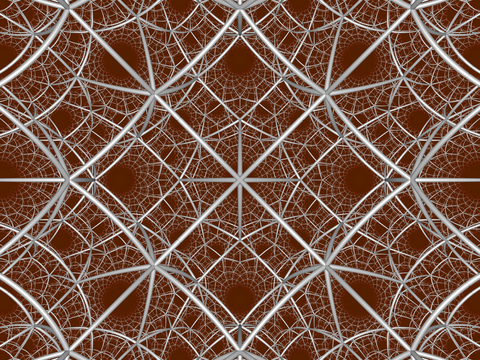| Order-4 square tiling honeycomb | |
|---|---|

| |
| Type | Hyperbolic regular honeycomb Paracompact uniform honeycomb |
| Schläfli symbols | {4,4,4} h{4,4,4} ↔ {4,4} {4} |
| Coxeter diagrams | |
| Cells | {4,4} |
| Faces | square {4} |
| Edge figure | square {4} |
| Vertex figure | square tiling, {4,4} |
| Dual | Self-dual |
| Coxeter groups | , , , |
| Properties | Regular, quasiregular |
In the geometry of hyperbolic 3-space, the order-4 square tiling honeycomb is one of 11 paracompact regular honeycombs. It is paracompact because it has infinite cells and vertex figures, with all vertices as ideal points at infinity. Given by Schläfli symbol {4,4,4}, it has four square tilings around each edge, and infinite square tilings around each vertex in a square tiling vertex figure.
A geometric honeycomb is a space-filling of polyhedral or higher-dimensional cells, so that there are no gaps. It is an example of the more general mathematical tiling or tessellation in any number of dimensions.
Honeycombs are usually constructed in ordinary Euclidean ("flat") space, like the convex uniform honeycombs. They may also be constructed in non-Euclidean spaces, such as hyperbolic uniform honeycombs. Any finite uniform polytope can be projected to its circumsphere to form a uniform honeycomb in spherical space.
Symmetry
The order-4 square tiling honeycomb has many reflective symmetry constructions: ![]()
![]()
![]()
![]()
![]()
![]()
![]() as a regular honeycomb,
as a regular honeycomb, ![]()
![]()
![]()
![]()
![]()
![]()
![]() ↔
↔ ![]()
![]()
![]()
![]()
![]() with alternating types (colors) of square tilings, and
with alternating types (colors) of square tilings, and ![]()
![]()
![]()
![]()
![]() with 3 types (colors) of square tilings in a ratio of 2:1:1.
with 3 types (colors) of square tilings in a ratio of 2:1:1.
Two more half symmetry constructions with pyramidal domains have symmetry: ![]()
![]()
![]()
![]()
![]()
![]()
![]() ↔
↔ ![]()
![]()
![]()
![]()
![]() , and
, and ![]()
![]()
![]()
![]()
![]()
![]()
![]() ↔
↔ ![]()
![]()
![]()
![]()
![]() .
.
There are two high-index subgroups, both index 8: ↔ , with a pyramidal fundamental domain: or ![]()
![]()
![]()
![]()
![]() ; and , with 4 orthogonal sets of ultra-parallel mirrors in an octahedral fundamental domain:
; and , with 4 orthogonal sets of ultra-parallel mirrors in an octahedral fundamental domain: ![]()
![]()
![]()
![]()
![]()
![]()
![]() .
.
Images
The order-4 square tiling honeycomb is analogous to the 2D hyperbolic infinite-order apeirogonal tiling, {∞,∞}, with infinite apeirogonal faces, and with all vertices on the ideal surface.
It contains ![]()
![]()
![]()
![]()
![]() and
and ![]()
![]()
![]()
![]()
![]() that tile 2-hypercycle surfaces, which are similar to these paracompact order-4 apeirogonal tilings
that tile 2-hypercycle surfaces, which are similar to these paracompact order-4 apeirogonal tilings ![]()
![]()
![]()
![]()
![]() :
:
Related polytopes and honeycombs
The order-4 square tiling honeycomb is a regular hyperbolic honeycomb in 3-space. It is one of eleven regular paracompact honeycombs.
| 11 paracompact regular honeycombs | |||||||||||
|---|---|---|---|---|---|---|---|---|---|---|---|
 {6,3,3} |
 {6,3,4} |
 {6,3,5} |
 {6,3,6} |
 {4,4,3} |
 {4,4,4} | ||||||
 {3,3,6} |
 {4,3,6} |
 {5,3,6} |
 {3,6,3} |
 {3,4,4} | |||||||
There are nine uniform honeycombs in the Coxeter group family, including this regular form.
| family honeycombs | |||||||||||
|---|---|---|---|---|---|---|---|---|---|---|---|
| {4,4,4} |
r{4,4,4} |
t{4,4,4} |
rr{4,4,4} |
t0,3{4,4,4} |
2t{4,4,4} |
tr{4,4,4} |
t0,1,3{4,4,4} |
t0,1,2,3{4,4,4} | |||

|

|

|

|

|

|

|

|

| |||
It is part of a sequence of honeycombs with a square tiling vertex figure:
| {p,4,4} honeycombs | ||||||
|---|---|---|---|---|---|---|
| Space | E | H | ||||
| Form | Affine | Paracompact | Noncompact | |||
| Name | {2,4,4} | {3,4,4} | {4,4,4} | {5,4,4} | {6,4,4} | ..{∞,4,4} |
| Coxeter |
||||||
| Image | 
|

|

|

|

|

|
| Cells |  {2,4} |
 {3,4} |
 {4,4} |
 {5,4} |
 {6,4} |
 {∞,4} |
It is part of a sequence of honeycombs with square tiling cells:
| {4,4,p} honeycombs | |||||||||||
|---|---|---|---|---|---|---|---|---|---|---|---|
| Space | E | H | |||||||||
| Form | Affine | Paracompact | Noncompact | ||||||||
| Name | {4,4,2} | {4,4,3} | {4,4,4} | {4,4,5} | {4,4,6} | ...{4,4,∞} | |||||
| Coxeter |
|||||||||||
| Image | 
|

|

|

|

| ||||||
| Vertex figure |
 {4,2} |
 {4,3} |
 {4,4} |
 {4,5} |
 {4,6} |
 {4,∞} | |||||
It is part of a sequence of quasiregular polychora and honeycombs:
| Quasiregular polychora and honeycombs: h{4,p,q} | |||||||||||
|---|---|---|---|---|---|---|---|---|---|---|---|
| Space | Finite | Affine | Compact | Paracompact | |||||||
| Schläfli symbol |
h{4,3,3} | h{4,3,4} | h{4,3,5} | h{4,3,6} | h{4,4,3} | h{4,4,4} | |||||
| Coxeter diagram |
|||||||||||
| Image | 
|

|

|

| |||||||
| Vertex figure r{p,3} |
 |
 |
 |
 |
 |
 | |||||
Rectified order-4 square tiling honeycomb
| Rectified order-4 square tiling honeycomb | |
|---|---|
| Type | Paracompact uniform honeycomb |
| Schläfli symbols | r{4,4,4} or t1{4,4,4} |
| Coxeter diagrams | |
| Cells | {4,4} r{4,4} |
| Faces | square {4} |
| Vertex figure |  cube |
| Coxeter groups | , , |
| Properties | Quasiregular or regular, depending on symmetry |
The rectified order-4 hexagonal tiling honeycomb, t1{4,4,4}, ![]()
![]()
![]()
![]()
![]()
![]()
![]() has square tiling facets, with a cubic vertex figure. It is the same as the regular square tiling honeycomb, {4,4,3},
has square tiling facets, with a cubic vertex figure. It is the same as the regular square tiling honeycomb, {4,4,3}, ![]()
![]()
![]()
![]()
![]()
![]()
![]() .
.
Truncated order-4 square tiling honeycomb
| Truncated order-4 square tiling honeycomb | |
|---|---|
| Type | Paracompact uniform honeycomb |
| Schläfli symbols | t{4,4,4} or t0,1{4,4,4} |
| Coxeter diagrams | |
| Cells | {4,4} t{4,4} |
| Faces | square {4} octagon {8} |
| Vertex figure |  square pyramid |
| Coxeter groups | , , |
| Properties | Vertex-transitive |
The truncated order-4 square tiling honeycomb, t0,1{4,4,4}, ![]()
![]()
![]()
![]()
![]()
![]()
![]() has square tiling and truncated square tiling facets, with a square pyramid vertex figure.
has square tiling and truncated square tiling facets, with a square pyramid vertex figure.
Bitruncated order-4 square tiling honeycomb
| Bitruncated order-4 square tiling honeycomb | |
|---|---|
| Type | Paracompact uniform honeycomb |
| Schläfli symbols | 2t{4,4,4} or t1,2{4,4,4} |
| Coxeter diagrams | |
| Cells | t{4,4} |
| Faces | square {4} octagon {8} |
| Vertex figure |  tetragonal disphenoid |
| Coxeter groups | , ] , , |
| Properties | Vertex-transitive, edge-transitive, cell-transitive |
The bitruncated order-4 square tiling honeycomb, t1,2{4,4,4}, ![]()
![]()
![]()
![]()
![]()
![]()
![]() has truncated square tiling facets, with a tetragonal disphenoid vertex figure.
has truncated square tiling facets, with a tetragonal disphenoid vertex figure.
Cantellated order-4 square tiling honeycomb
| Cantellated order-4 square tiling honeycomb | |
|---|---|
| Type | Paracompact uniform honeycomb |
| Schläfli symbols | rr{4,4,4} or t0,2{4,4,4} |
| Coxeter diagrams | |
| Cells | {}x{4} r{4,4} rr{4,4} |
| Faces | square {4} |
| Vertex figure |  triangular prism |
| Coxeter groups | , , |
| Properties | Vertex-transitive, edge-transitive |
The cantellated order-4 square tiling honeycomb, ![]()
![]()
![]()
![]()
![]()
![]()
![]() is the same thing as the rectified square tiling honeycomb,
is the same thing as the rectified square tiling honeycomb, ![]()
![]()
![]()
![]()
![]()
![]()
![]() . It has cube and square tiling facets, with a triangular prism vertex figure.
. It has cube and square tiling facets, with a triangular prism vertex figure.
Cantitruncated order-4 square tiling honeycomb
| Cantitruncated order-4 square tiling honeycomb | |
|---|---|
| Type | Paracompact uniform honeycomb |
| Schläfli symbols | tr{4,4,4} or t0,1,2{4,4,4} |
| Coxeter diagrams | |
| Cells | {}x{4} tr{4,4} t{4,4} |
| Faces | square {4} octagon {8} |
| Vertex figure |  mirrored sphenoid |
| Coxeter groups | , , , |
| Properties | Vertex-transitive |
The cantitruncated order-4 square tiling honeycomb, ![]()
![]()
![]()
![]()
![]()
![]()
![]() is the same as the truncated square tiling honeycomb,
is the same as the truncated square tiling honeycomb, ![]()
![]()
![]()
![]()
![]()
![]()
![]() . It contains cube and truncated square tiling facets, with a mirrored sphenoid vertex figure.
. It contains cube and truncated square tiling facets, with a mirrored sphenoid vertex figure.
It is the same as the truncated square tiling honeycomb, ![]()
![]()
![]()
![]()
![]()
![]()
![]() .
.
Runcinated order-4 square tiling honeycomb
| Runcinated order-4 square tiling honeycomb | |
|---|---|
| Type | Paracompact uniform honeycomb |
| Schläfli symbols | t0,3{4,4,4} |
| Coxeter diagrams | |
| Cells | {4,4} {}x{4} |
| Faces | square {4} |
| Vertex figure |  square antiprism |
| Coxeter groups | , ] |
| Properties | Vertex-transitive, edge-transitive |
The runcinated order-4 square tiling honeycomb, t0,3{4,4,4}, ![]()
![]()
![]()
![]()
![]()
![]()
![]() has square tiling and cube facets, with a square antiprism vertex figure.
has square tiling and cube facets, with a square antiprism vertex figure.
Runcitruncated order-4 square tiling honeycomb
| Runcitruncated order-4 square tiling honeycomb | |
|---|---|
| Type | Paracompact uniform honeycomb |
| Schläfli symbols | t0,1,3{4,4,4} |
| Coxeter diagrams | |
| Cells | t{4,4} |
| Faces | square {4} octagon {8} |
| Vertex figure |  square pyramid |
| Coxeter groups | , |
| Properties | Vertex-transitive |
The runcitruncated order-4 square tiling honeycomb, t0,1,3{4,4,4}, ![]()
![]()
![]()
![]()
![]()
![]()
![]() has square tiling, truncated square tiling, cube, and octagonal prism facets, with a square pyramid vertex figure.
has square tiling, truncated square tiling, cube, and octagonal prism facets, with a square pyramid vertex figure.
The runcicantellated order-4 square tiling honeycomb is equivalent to the runcitruncated order-4 square tiling honeycomb.
Omnitruncated order-4 square tiling honeycomb
| Omnitruncated order-4 square tiling honeycomb | |
|---|---|
| Type | Paracompact uniform honeycomb |
| Schläfli symbols | t0,1,2,3{4,4,4} |
| Coxeter diagrams | |
| Cells | tr{4,4} {8}x{} |
| Faces | square {4} octagon {8} |
| Vertex figure |  digonal disphenoid |
| Coxeter groups | , ] |
| Properties | Vertex-transitive |
The omnitruncated order-4 square tiling honeycomb, t0,1,2,3{4,4,4}, ![]()
![]()
![]()
![]()
![]()
![]()
![]() has truncated square tiling and octagonal prism facets, with a digonal disphenoid vertex figure.
has truncated square tiling and octagonal prism facets, with a digonal disphenoid vertex figure.
Alternated order-4 square tiling honeycomb
The alternated order-4 square tiling honeycomb is a lower-symmetry construction of the order-4 square tiling honeycomb itself.
Cantic order-4 square tiling honeycomb
The cantic order-4 square tiling honeycomb is a lower-symmetry construction of the truncated order-4 square tiling honeycomb.
Runcic order-4 square tiling honeycomb
The runcic order-4 square tiling honeycomb is a lower-symmetry construction of the order-3 square tiling honeycomb.
Runcicantic order-4 square tiling honeycomb
The runcicantic order-4 square tiling honeycomb is a lower-symmetry construction of the bitruncated order-4 square tiling honeycomb.
Quarter order-4 square tiling honeycomb
| Quarter order-4 square tiling honeycomb | |
|---|---|
| Type | Paracompact uniform honeycomb |
| Schläfli symbols | q{4,4,4} |
| Coxeter diagrams | |
| Cells | t{4,4} {4,4} |
| Faces | square {4} octagon {8} |
| Vertex figure |  square antiprism |
| Coxeter groups | , |
| Properties | Vertex-transitive, edge-transitive |
The quarter order-4 square tiling honeycomb, q{4,4,4}, ![]()
![]()
![]()
![]()
![]() , or
, or ![]()
![]()
![]()
![]()
![]()
![]()
![]() , has truncated square tiling and square tiling facets, with a square antiprism vertex figure.
, has truncated square tiling and square tiling facets, with a square antiprism vertex figure.
See also
- Convex uniform honeycombs in hyperbolic space
- Regular tessellations of hyperbolic 3-space
- Paracompact uniform honeycombs
References
- Coxeter The Beauty of Geometry, 1999, Chapter 10, Table III
- Coxeter, Regular Polytopes, 3rd. ed., Dover Publications, 1973. ISBN 0-486-61480-8. (Tables I and II: Regular polytopes and honeycombs, pp. 294–296)
- The Beauty of Geometry: Twelve Essays (1999), Dover Publications, LCCN 99-35678, ISBN 0-486-40919-8 (Chapter 10, Regular Honeycombs in Hyperbolic Space) Table III
- Jeffrey R. Weeks The Shape of Space, 2nd edition ISBN 0-8247-0709-5 (Chapter 16-17: Geometries on Three-manifolds I, II)
- Norman Johnson Uniform Polytopes, Manuscript
- N.W. Johnson: The Theory of Uniform Polytopes and Honeycombs, Ph.D. Dissertation, University of Toronto, 1966
- N.W. Johnson: Geometries and Transformations, (2018) Chapter 13: Hyperbolic Coxeter groups
- Norman W. Johnson and Asia Ivic Weiss Quadratic Integers and Coxeter Groups PDF Can. J. Math. Vol. 51 (6), 1999 pp. 1307–1336
 ,
,  ,
,  ,
,











 , ]
, ]
 ,
,




